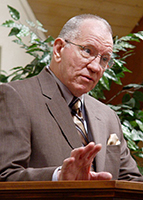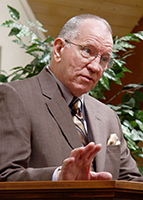The following is a transcript of a sermon delivered on Thursday afternoon, October 20th, 2011 during the annual Pastor’s Conference at Trinity Baptist Church in Montville, NJ. The preacher is Pastor Albert N. Martin and this is the eighth and final session of the conference.
Those of you who were here yesterday will remember that Dr. Ferguson had to do some patchwork when he was not able to complete all he had hoped to cover in his first lecture and trying to patch it in to what he had prepared for the second lecture.
As I lay on the pew in the back there going over materials with a similar exercise, the analogy came to me that the lecturer sits on the back of the horse called the preacher and if the lecturer lets the reins go, the preacher takes off and you don’t know how fast and how far he’s going to go.
Well, I let the reins go a couple of times in the previous hour and it’s put me in trouble trying to find a reasonable and edifying way to finish up what I had hoped to cover in the last hour and still give you the fruit of my study in some areas that I feel are crucial.
So, what I’ve decided to do is to conclude the material by basically just giving you the five heads connected with what I called The Fact of His Sinlessness Applied, hopeful that you will then investigate these areas on your own.







